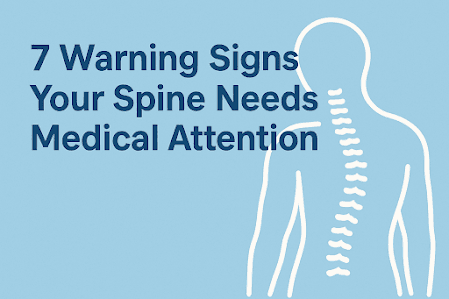7 Warning Signs Your Spine Needs Medical Attention
Back pain is one of the most common health issues people face today. While minor aches can come from lifestyle habits, certain symptoms may indicate a serious condition requiring immediate care. Identifying the early warning signs can prevent complications and ensure your spine stays healthy.
1. Persistent Back Pain That Doesn’t Improve
Occasional pain after strenuous activity is normal, but constant discomfort lasting more than a few weeks is not. If rest, exercise, and medication don’t ease your back pain, it may signal conditions like a herniated disc or spinal stenosis. Consulting a spine specialist early can prevent worsening problems.
2. Numbness or Tingling in Limbs
A healthy spine protects nerves that carry signals to your arms and legs. If you notice numbness, tingling, or weakness, it may mean the spinal cord or nerves are compressed. Conditions like sciatica or degenerative disc disease often present these symptoms. Prompt evaluation helps protect long-term nerve health.
3. Severe Neck Pain with Stiffness
Neck pain combined with stiffness can limit mobility and affect daily activities. This may indicate issues like cervical spondylosis or nerve compression. If accompanied by dizziness, headaches, or shoulder pain, it’s important to consult a spine surgeon for further evaluation.
4. Sudden Loss of Bladder or Bowel Control
Loss of bladder or bowel function is a medical emergency linked to cauda equina syndrome. This occurs when nerves at the base of the spine are severely compressed. Immediate spine surgery may be required to prevent permanent damage. Never ignore this red-flag symptom.
5. Shooting Pain Down the Leg (Sciatica)
If you feel sharp pain radiating from the lower back through the hip and down the leg, it may be sciatica. This happens when the sciatic nerve is irritated or pinched, often due to a slipped disc. Physical therapy, medications, or minimally invasive spine surgery may be recommended.
6. Visible Spinal Deformity
Noticeable curvature, hump, or misalignment in your back could point to scoliosis or kyphosis. Left untreated, these conditions may worsen over time, causing breathing difficulties or chronic pain. An orthopedic spine surgeon can diagnose and suggest corrective treatments.
7. Weakness Affecting Daily Activities
Difficulty lifting objects, walking, or maintaining balance may result from spinal cord compression. This weakness can progress quickly, impacting independence. Early consultation with a spine doctor ensures timely treatment and prevents disability.
Conclusion
Your spine is central to your overall health, supporting movement and protecting the nervous system. Recognizing these warning signs early can make treatment easier and recovery faster.
Ignoring chronic pain or neurological symptoms can lead to complications. Prioritize your spinal health and seek expert guidance without delay.
👉 For expert evaluation and advanced treatment, consult Dr. Sreenath Rao Jakinapally


Recent Comments